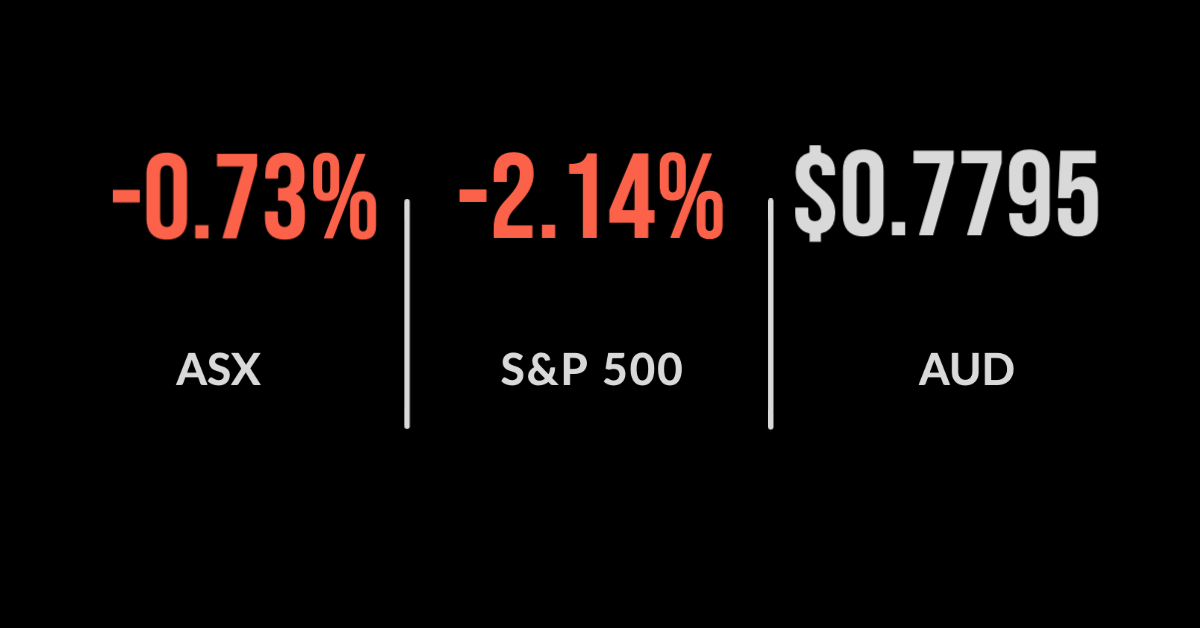ASX drops 0.7% in second straight loss
Sell off continues despite budget, Qantas tanks on flight delays, CBA delivers
The ASX200 (ASX:XJO) fell 0.7%, the second straight negative session, pushed lower by utilities and energy companies, down 2.2% and 2.0% respectively.
The Federal Budget which offers little in the way of future spending or policy direction was broadly in line with expectations, the deficit lower than first predicted and with the Government reiterating its focus on achieving full employment.
Aged care and infrastructure were the ‘winners’ whilst superannuants gained greater flexibility with the work test, contribution caps, and downsizer contribution criteria loosened.
The biggest negative was the announcement that global travel is unlikely to commence until mid-2022, with the news sending shares in Qantas (ASX:QAN) down 3.4%.
The Commonwealth Bank of Australia (ASX:CBA) was the latest to deliver a quarterly update, citing strong ‘operational performance’ was behind the near doubling of their third-quarter profit.
The group reported a 24% increase in net profit, overcoming just a 2% increase in revenue as deferred loans and remediation continues to fall; just 4% of deferred mortgages remain under review.
Management highlighted that business lending was growing at three times the level of the broader banking system, whilst home lending was around 10% higher.
Of most relevance to investors were comments around the banks increasing capital level, now at 12.7% with the potential for buybacks ahead; shares bucked the market trend to finish 1.1% higher.
Economic recovery powers CSR, Carsales in major acquisition, Ausnet profit up despite revenue fall
Building product provider CSR (ASX:CSR) which is seeing strong growth on the back of the stay-at-home renovation boom in Australia and the US, jumped 4.2% after delivering another strong quarter.
The group reported a 17% increase in profit to $146.1 million despite a 4% fall in revenue, earnings also increased 10% suggesting a reduction in inventory and production costs may have brought forward a portion of profits.
The group announced a special dividend of 9.5 cents per share following the sale of the Horsley Park property, with the ordinary dividend also increasing to 14.5 cents.
Carsales (ASX:CAR) shares entered a trading halt after the company announced a $600 million capital raising to fund an opportunistic acquisition of Trader Interactive, an online vehicle marketplace in the US, for US$624 million.
Electricity grid owner Ausnet (ASXAST) fell 7.7% after reporting just a 4% increase in net profit for the year in March to $302 million.
The result came despite a 2.7% fall in revenue, with cash flow jumping 17.2% likely due to a reduction in Capex and maintenance during the pandemic.
The company cut the dividend, paying 4.5 cents per share, bringing the financial year total to 9.5 cents compared to 10.2 cents in 2020.
Inflation spikes to 4.2%, Dow pares 600 point loss, tech rallies despite valuation concerns
The will it or won’t it question on inflation was confirmed this morning, as predicted in my regular weekend updates, with US CPI reaching 4.2% for the 12 months to the end of April.
The result was far higher than the 3.6% predicted, sending markets in a sharp selloff with the Dow Jones down 600 points at one stage.
Ultimately, the losses weren’t as significant with the Dow falling 2.0%, the S&P 500 2.1%, and the Nasdaq 2.7%.
It is an interesting event as the Federal Reserve has been predicting a short-term inflation spike for some time, confirming they had no intention to raise rates regardless of the result, yet traders continue to assume a rate hike will be inevitable.
Not unexpectedly, the comparison to prices before the pandemic saw everything from food, up 2.4%, and restaurant meals, +3.8%, as well as used car prices, up 82%, moving higher.
The energy sector was the only part to finish in positive territory with consumer-facing businesses like Amazon (NYSE:AMZN) and PayPal (NYSE:PYPL) hardest hit, down 2.2% and 3.5%.







